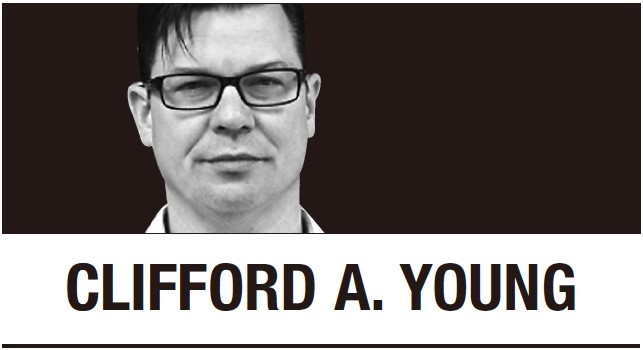[Clifford A. Young, Justin Gest] Elections a salve to soothe populism
By Korea HeraldPublished : June 22, 2023 - 05:42


As Donald Trump’s star rises again even with multiple criminal indictments looming, many observers fear that anti-establishment populism in America is no longer just a flirtation, but a feature of our democratic system.
More generally, it has become common to think that democracies anywhere -- with their open public spheres, majoritarian institutions and propensity for frustrating incrementalism -- have fueled the rise of populist leaders and demagogues. Examples of the success of “strongmen” leaders abound in Brazil, Hungary, India, Italy, Turkey, El Salvador and the United States.
But it is equally possible that the very attributes of democracy that have invigorated populism are also those that will ultimately moderate its spread. Democracies’ transparent public spheres expose populists’ corruption, and the separations of power in a democracy tend to hold populists responsible for failures of governance.
New evidence suggests that elections -- the hallmark of democracy itself -- may be an equally powerful check.
According to a new Ipsos poll of about 26,000 people across 28 countries worldwide, recent democratic elections are associated with a decline in the sentiment that “the system is broken.” Independently of who is elected, democratic processes themselves may provide a cathartic release of frustration and reassure people of their enduring power.
Between April 2021 and November 2022, there was a global decline of broken system sentiment, roughly returning to levels last seen in 2016. The six countries with the steepest drop each conducted a national election resulting in major political change; none of the four countries showing an uptick in this sentiment had a national election during the same period.
Since 2021, there has been a 7 percent global drop in the perception that the “economy is rigged,” a 5 percent and 6 percent drop in the perception that politicians “don’t care” and experts “don’t understand” average people, respectively, and a 5 percent drop in the belief that the country needs a strong leader to take control “back from the rich and powerful.” The global share of people who want a strong leader who is “willing to break the rules” remains effectively unchanged.
In Brazil last October, where the leftist former President Luis Ignacio “Lula” da Silva narrowly defeated the populist incumbent Jair Bolsonaro, 15 percent fewer people want a strong leader willing to break the rules. In Italy, which recently ushered a far-right government into power, the shares of people who distrust experts and seek a strong leader both dropped by 19 percent.
Indeed, in all six countries showing the greatest drops in anti-establishment feelings -- Chile, Colombia, South Korea, Italy, Brazil and Peru -- the election brought in a new head of government from a different party than the incumbent.
The greatest gains in broken system sentiment across the board are in the United Kingdom, where the Conservative Party has two more years before it must call a national election despite experiencing historically low public approval numbers.
On average, countries that conducted national elections dating back to 2016 saw a 1.4 percentage point global drop in the feeling that traditional parties and politicians don’t care about people like them, while those without elections experienced a 0.8 percentage point global increase.
Still, while elections appear to be a salve, they are not a full remedy. In the short term, elections that replace those in government have a cathartic effect; they act as a pressure relief valve for public frustration. But fresh leaders do not necessarily mean a better or more responsive government.
Indeed, the populist wave is far from ebbing. The prevailing view among most people polled by Ipsos remains that their political and economic system is indeed broken. On average, 64 percent feel their country’s economy is rigged to advantage the rich and powerful and 63 percent say that traditional parties and politicians don’t care about people like them. This is fertile ground for populist leaders and parties in the future.
But we should also not expect broken system sentiment to disappear. So long as populist parties and leaders are operating, they will persuade a share of voters that the system is rigged against them, even when there is ample evidence to the contrary -- a sort of feedback loop.
More profoundly, the polling reveals the intrinsic virtue of free and fair elections. Independent of who wins, elections mitigate the authoritarian tendencies and attitudes that lead ordinary citizens to turn against the political system.
The takeaway from this poll is clear. Policies that strengthen election institutions -- both here and abroad -- should be democracy advocates’ central focus. As for sitting governments? Deliver on your promises, or be replaced.
Clifford A. Young, Justin Gest
Clifford A. Young is the president of Ipsos Public Affairs, US. Justin Gest is a professor at George Mason University’s Schar School of Policy and Governance. This column was produced for Progressive Perspectives, a project of the Progressive magazine. -- Ed.
(Tribune News Service)
-
Articles by Korea Herald



















![[Today’s K-pop] Treasure to publish magazine for debut anniversary](http://res.heraldm.com/phpwas/restmb_idxmake.php?idx=642&simg=/content/image/2024/07/26/20240726050551_0.jpg&u=)